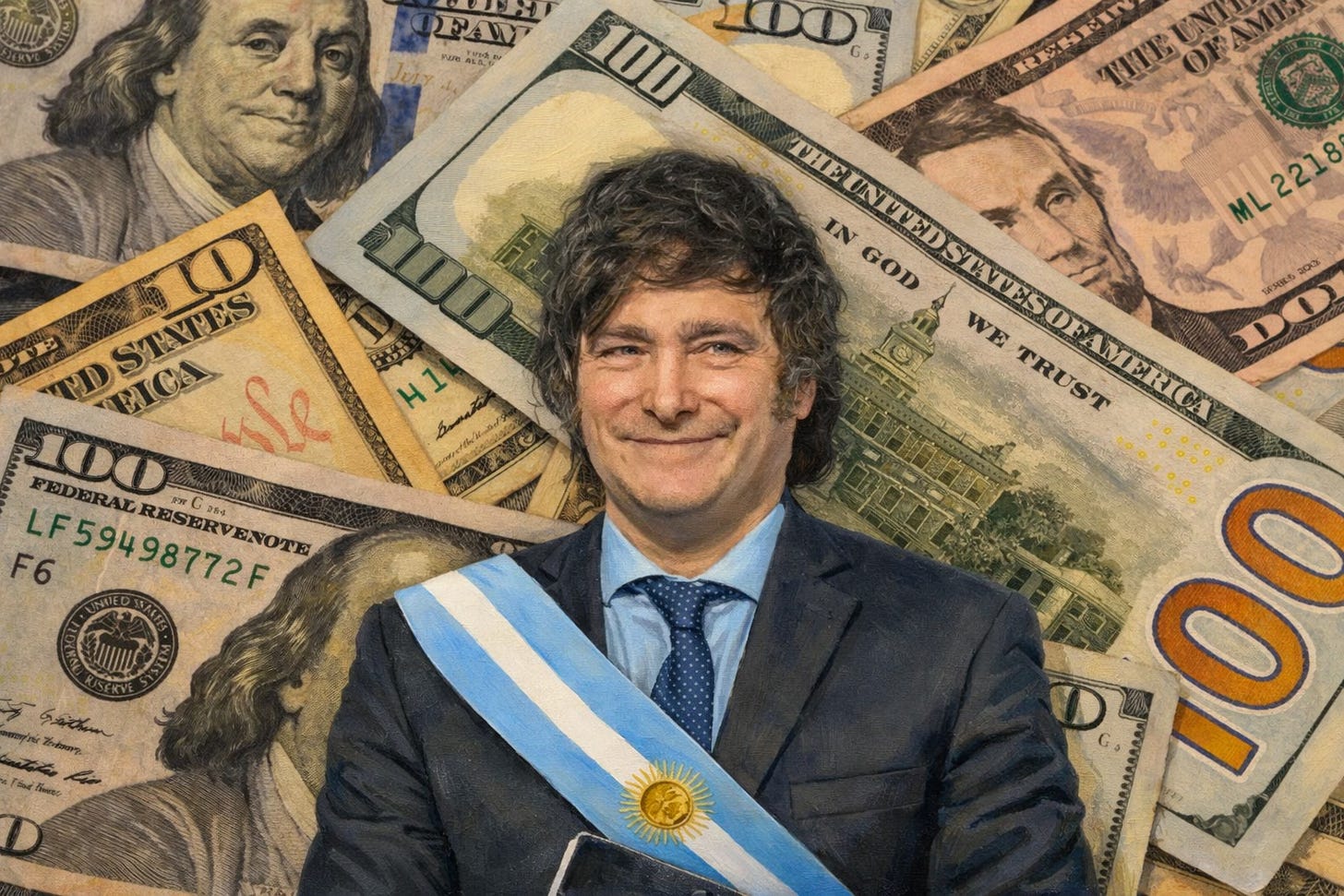Argentina’s Election Bailout
A stronger peso today but a deeper crisis tomorrow financed by America.
Uncle Sam is propping up Argentina’s currency to get Javier Milei through October 26. Not forever. Just long enough.
The sticker price is twenty billion dollars and a very public show of muscle from the U.S. Treasury, not the Fed and not the IMF.
The morning after Milei’s drubbing in Buenos Aires Province, trading floors were a mess. Peso at 1,475 per dollar. The central bank torched $1.1 billion in three days trying to hold the line.
Country risk blew past 1,200 basis points. The Merval fell nearly 13% in a day and took the crown for worst major stock market of 2025.
Then a tweet from Treasury Secretary Scott Bessent hit X, floating a $20 billion swap line, ESF lending, even bond buying. The run slowed. The peso clawed back toward 1,350.
Crisis paused, not solved.
This is a pre-election market fix with a U.S. return address.
Let’s be clear. This is the Exchange Stabilization Fund. It lives in the executive branch. It bypasses Congress. It sidelines the IMF, even though Argentina is the Fund’s largest debtor after twenty-three bailouts.
That is deliberate. The message is simple: all options on the table, and the calendar matters.
On paper, Milei delivered. Inflation that flirted with 300% last year cooled to a little over 30%, with monthly prints averaging 1.7% in the last quarter, an eight-year low. The government projects a primary surplus of 1.6% of GDP, beating the IMF target.
This came from a brutal fiscal squeeze and a crawling peg that narrowed the gap between official and parallel rates.
Now the bill.
Unemployment climbed to 7.6%. Poverty rose. Consumption cratered. Small and midsize firms failed. The strong-peso mix juiced imports and blew a hole in the external accounts. Consumer-goods imports jumped 64.8% by volume, cars 69.3%.
The travel deficit ballooned to $3.5B. The current account swung to a $5.2B deficit in the first quarter. Gross debt hit $473.6B, and foreign-currency debt towered at 1,012.8% of reserves.
In the country’s biggest province, the Peronists took 47% to Milei’s 34%. He conceded a clear defeat and promised not to move one millimeter.
What Washington is actually doing is a swap line plus ESF credit, with the added threat of bond purchases. Traders now face the U.S. Treasury, not a reserve-poor central bank. Bonds caught a bid. The peso bounced.
Panic broke.
Argentina faced a classic run. A credible backstop changes the game theory, deters shorts, stops a self-fulfilling crash, and buys time before voters head to the polls. The ESF has precedent in Mexico in 1994 and can even leave U.S. taxpayers whole.
The U.S. also has strategic reasons: keep a market-friendly ally afloat, crowd in American investment, and box out Beijing. On those terms, a fast, targeted intervention looks prudent.
The core problem is a misaligned exchange rate that is shredding the external accounts. The U.S. package papers over that and encourages delay.
There is another cost. Sovereign risk just got politicized. Pimco’s Pramol Dhawan says the quiet thing: Washington is willing to use financial tools to reward friends and punish enemies.
If you own Argentina, you are no longer modeling only inflation and reserves. You are handicapping the White House. That raises the risk premium and can choke the very investment the government says it wants.
Who benefits? Milei’s campaign, importers, upper-income consumers, bondholders.
Who pays? Exporters, the external accounts, later the voters through a sharper adjustment, and maybe U.S. taxpayers if the politics turn.
Who decides? Treasury and the White House. Not the IMF board. Not Congress.
What is missing: terms on maturity, pricing, triggers, collateral; clear conditionality; bond-buying size and cadence; any credible post-election FX plan.
Twenty billion is a headline, not a term sheet.
This playbook can rent six weeks. If Milei wins a mandate and fixes the FX regime fast, this U.S. move will read like a bridge.
If not, it is a plank over a cliff.
Either way, Argentine risk now trades as a derivative of U.S. politics. That should unsettle you, whether you sit in La Matanza or Midtown.


